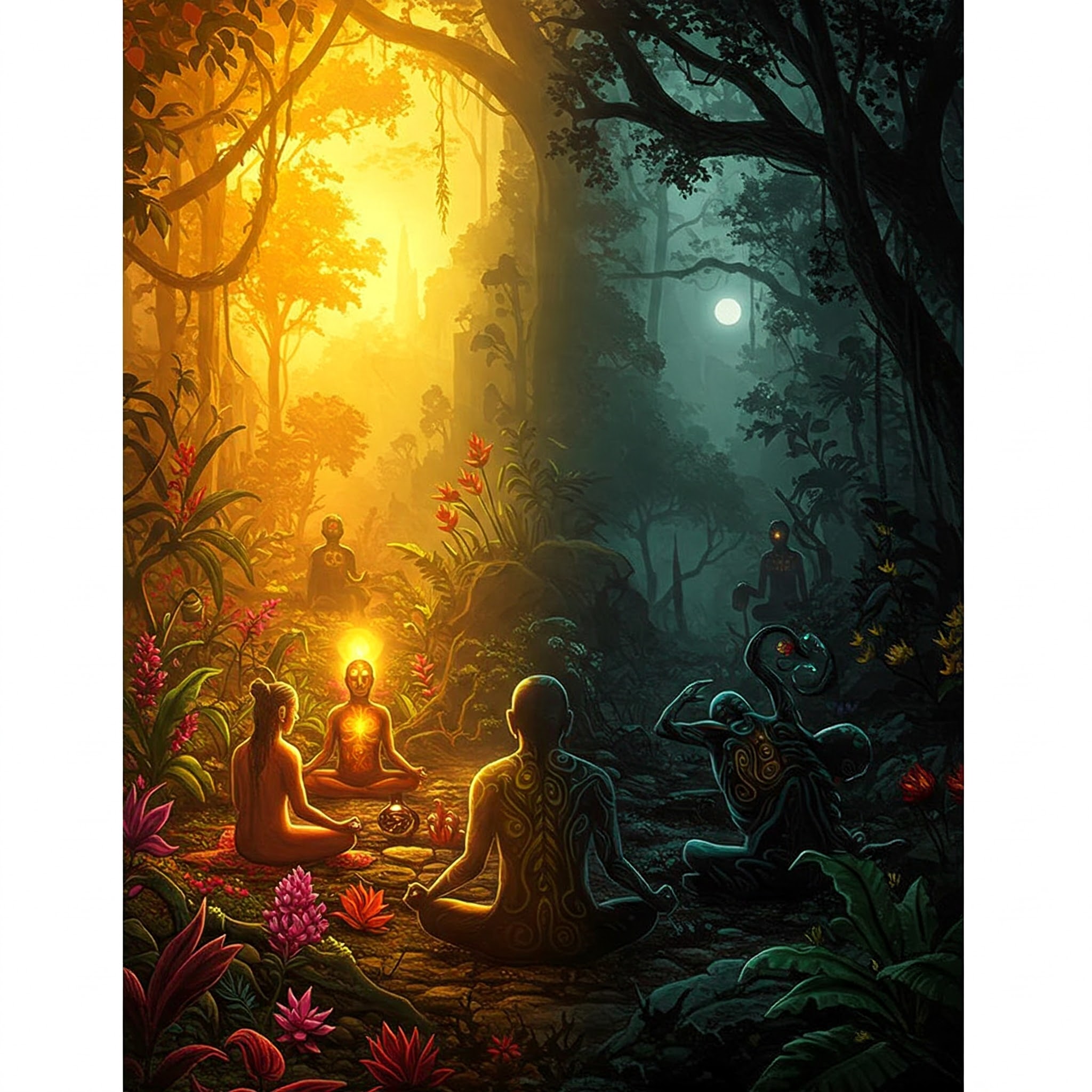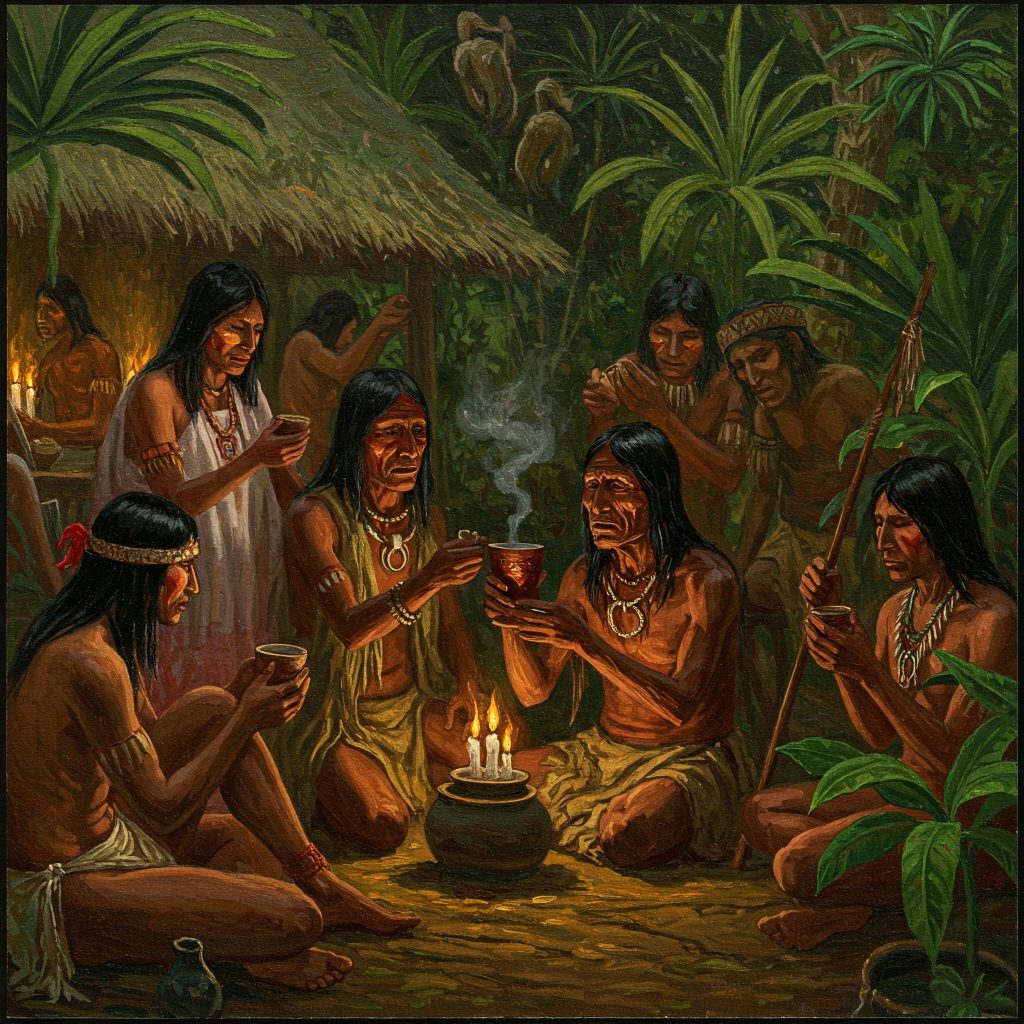Exploring the Transformative Power of Nature
Ayahuasca
Explore the profound insights and contemporary research surrounding Ayahuasca as a powerful tool for personal transformation and emotional restoration.
The history of Ayahuasca
Ayahuasca is a psychedelic plant brew that has been used for centuries by indigenous peoples in the Amazon basin for spiritual, healing, and divinatory purposes. The exact origins of ayahuasca are unknown, but it is thought to have been used for thousands of years.
Origins
The origins of ayahuasca are shrouded in mystery, but it is believed to have been used by indigenous peoples in the Amazon basin for thousands of years. The earliest evidence of ayahuasca use dates back to around 2400 BCE, with the discovery of small ceramic vessels associated with ayahuasca rituals in Peru.
Use by Indigenous Cultures
Ayahuasca has been used by indigenous cultures in the Amazon for a variety of purposes, including:
- Spiritual and religious practices: Ayahuasca has been used in shamanic ceremonies for centuries to connect with the spiritual world, communicate with ancestors, and gain insights into the future.
- Healing: Ayahuasca has been used to treat a variety of physical and mental ailments, including addiction, depression, and anxiety.
- Divination: Ayahuasca has been used to predict the future and gain knowledge about hidden things.
Spread of Ayahuasca
In the 19th century, ayahuasca began to spread beyond the Amazon basin, as it was introduced to urban areas of Brazil and other parts of South America. In the 1980s, ayahuasca began to gain popularity in Western cultures, as people sought out alternative ways to heal and connect with the spiritual world.
Modern Use of Ayahuasca
Today, ayahuasca is used by people from all walks of life for a variety of purposes, including:
- Spiritual exploration: Many people use ayahuasca to explore their spirituality and connect with the divine.
- Healing: Ayahuasca has been shown to be effective in treating a variety of mental health conditions, including addiction, depression, and anxiety.
- Personal growth: Ayahuasca can help people to gain insights into themselves and their lives, and to make positive changes.
Controversies and Concerns
The use of ayahuasca has also been associated with a number of controversies and concerns, including:
- Safety: Ayahuasca can be a dangerous substance, especially if it is not used under the supervision of a qualified practitioner.
- Legal status: Ayahuasca is illegal in many countries, including the United States.
- Cultural appropriation: Some people believe that the use of ayahuasca by non-indigenous people is a form of cultural appropriation.
Conclusion
Ayahuasca is a complex and controversial substance with a long and rich history. It is important to use ayahuasca responsibly and under the guidance of a qualified practitioner.
Additional Information
Recent Discoveries
Ayahuasca studies
It’s important to approach ayahuasca research with a nuanced perspective, considering the complexities of its traditional use, its pharmacological effects, and the ethical considerations surrounding its study.
1. Therapeutic Potential:
- Depression:
- Palhano-Fontes, F., et al. (2019).
2 Rapid antidepressant effects of the psychedelic ayahuasca in treatment-resistant depression: a randomized placebo-controlled trial.Psychological Medicine,3 49(4), 655–663.
- Palhano-Fontes, F., et al. (2019).
- Substance Use Disorders:
- Loizaga-Velder, A., & Verres, R. (2014). Therapeutic effects of ayahuasca in the treatment of addiction: results of a pilot study in Switzerland. Current Drug Abuse Reviews, 7(2), 117–124.
- PTSD and Anxiety:
- Research in this area is ongoing, with studies exploring ayahuasca’s impact on emotional processing and trauma.
6 Many articles about this topic can be found on sites such as pubmed, and researchgate. - Study about the influence of Ayahuasca on emotional processing and trauma.
- Research in this area is ongoing, with studies exploring ayahuasca’s impact on emotional processing and trauma.
2. Neuropharmacological Effects:
- Brain Imaging:
- Studies using fMRI and EEG are investigating how ayahuasca affects brain networks and activity.
- Many research papers on this topic can be found on the site Frontiers in Psychiatry.
- Neuroplasticity:
- Research is exploring ayahuasca’s potential to promote neurogenesis and synaptic plasticity.
- Link to study.
- Research is exploring ayahuasca’s potential to promote neurogenesis and synaptic plasticity.
3. Psychological and Spiritual Effects:
- Mindfulness and Well-being:
- Studies examine the impact of ayahuasca on psychological well-being and mindfulness capacities.
- Link to study.
- Studies examine the impact of ayahuasca on psychological well-being and mindfulness capacities.
- Spiritual Experiences:
- Research delves into the nature of ayahuasca-induced spiritual experiences and their psychological correlates.
4. Safety and Risks:
- Adverse Effects:
- Research addresses potential risks, including psychological distress and interactions with medications.
- White, E., Kennedy, T., Ruffell, S., Perkins, D., & Sarris, J. (2024). Ayahuasca and Dimethyltryptamine Adverse Events and Toxicity Analysis: A Systematic Thematic Review. Journal of Psychoactive Drugs.
- This study gives a systematic review of adverse events related to ayahuasca.
- Because this is a very recent study, finding a direct link is difficult, however searching the title of the study will provide you with access to the paper.
- Drug Interactions:
- It’s crucial to understand the potential for dangerous interactions with certain medications and foods.
Important Considerations:
- The “set and setting” (mindset and environment) significantly influence the ayahuasca experience. Link to study.�
- Ethical considerations are paramount in ayahuasca research, particularly regarding indigenous rights and cultural sensitivity. Link to study.�
- It is very important to remember that ayahuasca contains MAOI’s, and therefore has very specific dietary restrictions. Link to study�
To find more research, I recommend searching these databases:
- PubMed
- Google Scholar
- ScienceDirect
- Researchgate
Ayahuasca benefits and dangers
Ayahuasca: Risks and Benefits
Ayahuasca is a psychedelic plant brew that has been used for centuries by indigenous peoples in the Amazon basin for spiritual, healing, and divinatory purposes (link to study).�In recent years, ayahuasca has gained popularity in Western cultures as a tool for personal growth, spiritual exploration, and healing.�However, it is important to note that ayahuasca is a powerful substance that can have unpredictable effects (link to study).It is important to use ayahuasca responsibly and under the guidance of experienced practitioners.
Benefits of Ayahuasca
There is some evidence that ayahuasca may be beneficial for a variety of mental health conditions, including depression, anxiety, and addiction.
Ayahuasca may also be beneficial for people with post-traumatic stress disorder (PTSD) (Link to study). A 2018 research paper suggests that ayahuasca may help people with PTSD to process traumatic memories.(Link to study)�
Dangers of Ayahuasca
Ayahuasca can be a dangerous substance, especially if it is not used under the supervision of a qualified practitioner. Some of the potential risks of ayahuasca use include:
- Psychological distress: Ayahuasca can cause intense psychological experiences, such as anxiety, paranoia, and panic attacks. (Link to study)�
- Physical side effects: Ayahuasca can cause physical side effects, such as nausea, vomiting, and diarrhea. (Link to study)�
- Drug interactions: Ayahuasca can interact with other medications, such as antidepressants and psychiatric medications.(Link to study).
- Heart problems: Ayahuasca can increase heart rate and blood pressure, which can be dangerous for people with heart problems. (Link to study).
- Death: There have been a few reported deaths associated with ayahuasca use.
Conclusion
Ayahuasca is a complex and controversial substance with a long and rich history. (Link to study). It is important to use ayahuasca responsibly and under the guidance of a qualified practitioner.
Additional Information

Ayahuasca experiences
“When I finally puked on the fourth night, I felt an odd sense of pride.
Inside the loud, stuffy ceremony room, people were laughing, crying, chanting, gyrating, and, yes, vomiting, around me. When my time finally comes, I think: Just aim for the bucket and keep your ass above your head like the shaman told you.”

Sean Illing
Internet publisher
“I had heard about the substance and its effects for years when I lived in the San Francisco Bay Area, but I didn’t want to do it in some random apartment in Oakland. I wanted the “real” experience.
I had always thought that meant flying to Peru and spending a week camped out in the jungle with a shaman. But.. “

Tiago Forte
Founder of productivity consultancy/training firm�Forte Labs, and editor of Praxis
Video’s
Common Questions About Ayahuasca
Discover answers to the most frequently asked questions about Ayahuasca.
What is Ayahuasca?
Ayahuasca is a psychedelic plant brew traditionally used by indigenous peoples in the Amazon rainforest for spiritual, healing, and divinatory purposes. It is typically made from two plants: the Banisteriopsis caapi vine and the Psychotria viridis shrub.
What are the Effects of Ayahuasca?
Ayahuasca can produce a wide range of effects, including:
- Altered states of consciousness
- Vivid hallucinations and visions
- Emotional release and catharsis
- Feelings of euphoria or bliss
- Deep introspection and self-reflection
- Physical purging (vomiting, diarrhea)
What are the Benefits of Ayahuasca?
- Potential for Healing: Some studies suggest ayahuasca may have therapeutic potential for conditions like depression, anxiety, addiction, and PTSD.
- Spiritual Growth: Many people report profound spiritual experiences and insights from ayahuasca use.
- Increased Self-Awareness: Ayahuasca can facilitate self-reflection and help individuals gain a deeper understanding of themselves and their place in the world.
What are the Risks of Ayahuasca?
- Psychological Distress: Ayahuasca can trigger anxiety, paranoia, and other challenging psychological experiences.
- Physical Side Effects: Nausea, vomiting, and diarrhea are common side effects.
- Drug Interactions: Ayahuasca can interact negatively with certain medications, particularly antidepressants.
- Heart Problems: Ayahuasca can increase heart rate and blood pressure, which can be dangerous for people with heart conditions.
- Bad Trips: Some individuals experience intense and unpleasant experiences during an ayahuasca ceremony.
Is Ayahuasca Legal?
The legality of ayahuasca varies by country. In some countries, it is illegal, while in others, its use is regulated or permitted for traditional or religious purposes.
How Should I Prepare for an Ayahuasca Ceremony?
- Choose a Reputable Guide: Work with a qualified and experienced shaman or facilitator.
- Cleanse Your Body: Avoid alcohol, drugs, and heavy foods for several days before the ceremony.
- Set an Intention: Consider what you hope to gain from the experience.
- Prepare Your Mind and Body: Get enough rest and ensure you are in a healthy physical and mental state.
What Should I Expect During an Ayahuasca Ceremony?
Ayahuasca ceremonies vary, but typically involve:
- Intense Physical and Psychological Effects: You may experience nausea, vomiting, visions, and emotional release.
- Guidance from the Shaman: The shaman will provide support and guidance throughout the experience.
- Integration and Aftercare: It is important to integrate the experience and process any insights or emotions that arise.
Who Should Avoid Ayahuasca?
People with certain medical conditions, such as heart problems, high blood pressure, or those taking certain medications, should avoid ayahuasca. It is also not recommended for pregnant or breastfeeding women.
Is Ayahuasca Safe?
Ayahuasca can be a powerful and transformative experience, but it is important to approach it with caution and respect. Using it in a safe and responsible setting with experienced guidance is crucial. Ask your doctor for advice and do your own research.
How should I prepare for an ayahuasca retreat?
-
Choose a Reputable Retreat Center and Shaman: Do your research to find a reputable retreat center that aligns with your values and offers a safe and supportive environment. Look for centers that prioritize ethical practices, experienced shamans, and a focus on integration.
-
Cleanse Your Body: Avoid alcohol, recreational drugs, and heavy or processed foods for several days before the retreat. This will help prepare your body for the ayahuasca experience.
-
Set an Intention: Consider what you hope to gain from the ayahuasca experience. Setting a clear intention can help guide your journey and deepen your insights.
-
Prepare Your Mind and Body: Get enough rest and ensure you are in a healthy physical and mental state. This will help you approach the experience with a clear mind and open heart.
-
Communicate with the Retreat Center: Reach out to the retreat center with any questions or concerns you may have. They can provide you with additional information and guidance on how to prepare.
-
Pack Light: Bring only the essentials, such as comfortable clothing, toiletries, and a journal for reflection.
Leave any valuables at home. -
Be Open and Receptive: Approach the ayahuasca experience with an open mind and a willingness to explore the unknown. Remember that the journey is unique to each individual.
-
Integration and Aftercare: Plan for some time after the retreat to integrate your experiences and process any insights or emotions that arise. Consider scheduling a follow-up session with the shaman or attending an integration circle.
Remember, ayahuasca is a powerful medicine and should be approached with respect and reverence.
What is integration, and why is it important?
Integration involves processing and applying insights gained during the retreat to your daily life. It’s crucial for maximizing the benefits of your experience.
Can anyone attend a ayahuasca retreat?
Attending an ayahuasca retreat is not a simple matter of signing up. Reputable ayahuasca retreat centers have screening processes to ensure the safety and well-being of their participants.
Key Considerations:
- Medical and Psychological Screening:
- Ayahuasca interacts with certain medications, particularly antidepressants (SSRIs, MAOIs), and can be dangerous for individuals with pre-existing health conditions, especially heart problems or a history of psychosis.
- Retreat centers typically require participants to disclose their medical history and may request a doctor’s clearance.
- A history of severe mental health conditions like schizophrenia or bipolar disorder is often a contraindication.
- Ayahuasca interacts with certain medications, particularly antidepressants (SSRIs, MAOIs), and can be dangerous for individuals with pre-existing health conditions, especially heart problems or a history of psychosis.
- Medication Interactions:
- Many pharmaceutical drugs are contraindicated with ayahuasca. This is especially true for medications that affect serotonin levels.
- Individuals taking such medications may need to taper off them under the supervision of their doctor, well in advance of the retreat.
- Dietary Restrictions:
- Ayahuasca involves dietary restrictions (the “dieta”) before, during, and after the ceremonies.
These restrictions are crucial for safety and to maximize the effectiveness of the medicine. - Individuals unwilling or unable to adhere to these dietary guidelines may not be suitable candidates.
- Ayahuasca involves dietary restrictions (the “dieta”) before, during, and after the ceremonies.
- Personal Suitability:
- Ayahuasca is a powerful experience, and individuals should be mentally and emotionally prepared for it.
- Retreat centers may assess an individual’s readiness and motivations for attending.
- Ethical Considerations:
- Reputable retreat centers prioritize ethical practices and respect for the traditional use of ayahuasca.
- They may screen out individuals with exploitative or disrespectful intentions.
In summary:
- Not everyone is a suitable candidate for an ayahuasca retreat.
- Thorough medical and psychological screening is essential.
- Adherence to dietary restrictions is crucial.
- Personal readiness and ethical considerations play a role.
It is strongly advised to thoroughly research any ayahuasca retreat center and to be honest and transparent about your medical history and intentions.
What are the legal considerations for attending a retreat?
Our retreats comply with local laws and regulations. We advise participants to familiarize themselves with the legal status of psychedelic substances in their home country.
Embark on a Transformative Journey
Unlock the profound wisdom of psychedelic plants and mushrooms with our expertly guided retreats. Dive deep into an enriching experience that promises personal growth and a renewed sense of purpose. Sign up today to begin your journey with us at Innessence in Limburg, The Netherlands.

